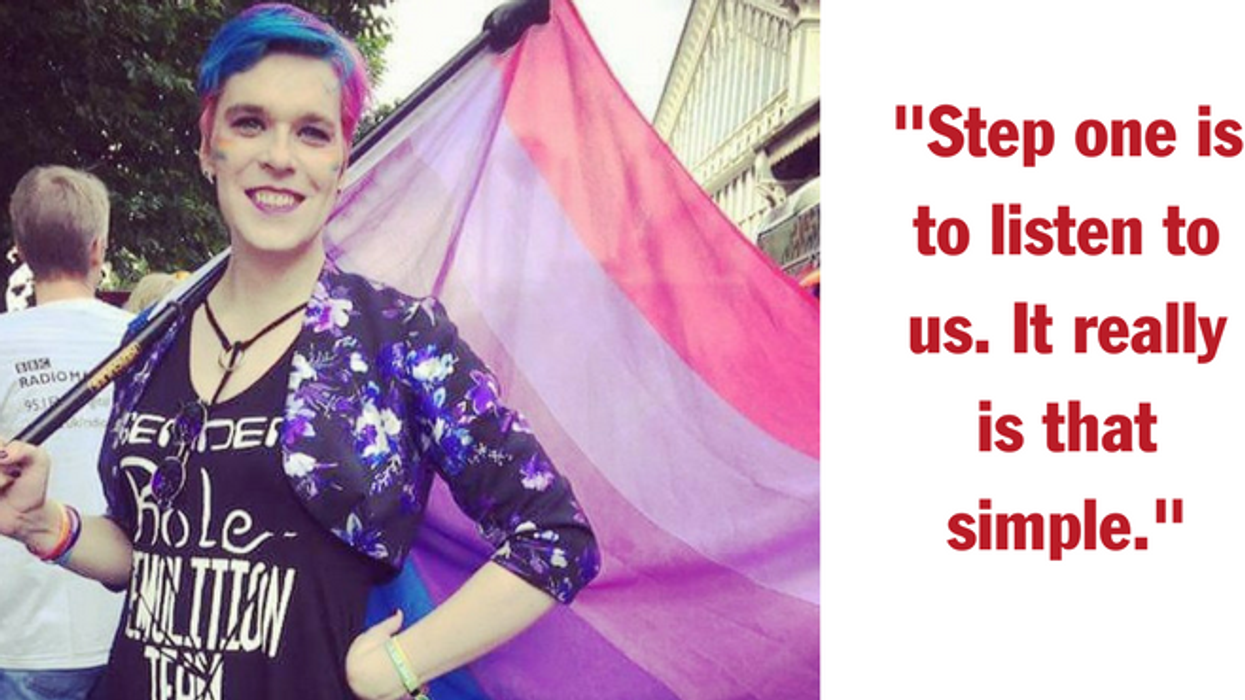Transgender activist and bass player Ashleigh Talbot sat down with Indy100 for an exclusive interview, in which she explains how those who are cisgender can better respect and build more meaningful relationships with trans people. Cisgender is defined as a "person whose sense of personal identity and gender corresponds with their birth sex."
As progress continues to be made on LGBT rights, the T (transgender), is unfortunately overlooked and is often misunderstood. Talbot, a musician and activist. has been "out" as trans for six years.
Talbot's first suggestion in her interview is to simply listen to transgender individuals.
"Step one is to listen to us. It really is that simple.
When I've spoken to the media about [using the phrase 'born in the wrong body'] before and made a specific point of saying 'Please don't use this phrase to describe me, and here's why…' this request has been ignored, as that phrase is so culturally ingrained now as to be the go-to shorthand, but it's a long way from the full story and I think it's time we moved on."
Her second piece of advice for cisgender members of the community is to be thoughtful about the types of questions they ask. If it's not a question that's socially appropriate, don't ask it. Asking about genitals is one such question that typically should be avoided.
"I started a temp role at the end of July last year and on the very first day, at the very first break time and after I'd known [my new team leader] for a grand total of two hours, she asked me –in front of several other people- if I'd had "the op". She even made a "down there" gesture with her hands.
So I then had to explain as politely as I could (first day, remember) that actually that's a really personal question. Do you ask everyone you meet about their genitals?"
Third, Talbot says it's okay to ask about preferred pronouns, so long as it's done so politely and respectfully.
"Think of asking a cis woman if she'd prefer Ms. or Mrs., for example. Please try not to make any assumptions and if you're unsure of someone's pronoun, it's usually considered polite to ask '"What pronoun do you use?'" Everyone has their own way of expressing and dealing with being trans and there are as many different experiences as there are trans people."
Number 4: every transgender person's life experiences are as unique as they are.
"Saying to a trans person –who has almost certainly lost sleep, thought long and hard about gender dysphoria and may well have thought of or attempted suicide; who has spent every waking moment for many many years dealing with having these feelings and has in all likelihood tried various ways of making it stop, from drink & drug abuse to putting a lot of effort into being a 'manly masculine manly straight man' even though deep down you know that's not going to fix it – "Oh. I just don't think you've thought about it enough. I mean, how do you know you're sure…?""
And finally, keep an open mind. Don't take offense if a trans person corrects something you say. It's for your own benefit. Talbot explains that only trans people get to decide what is and isn't offensive to trans people.
"There's a relative of mine who regularly gets my name wrong and/or pronoun wrong, but then when I try to correct them, the response is a haughty "Well it's difficult for us too, you know!" Is it. Is it really. Fascinating. See also; RuPaul. It's really disheartening to see so many gay men supporting RuPaul after several years of transphobic comments. When people point out how offensive this is, he doubles down and insists he isn't being transphobic, when really that's not a judgement he gets to make. I wouldn't insult a gay man in a similar way and then tell him it's not homophobic. It's not my place to do that, I don't get to make that decision. So you, Ru, don't get to decide what is and isn't offensive to the trans community."
These are easy, common sense steps everyone can take to help shape a more tolerant and inclusive world.


















 @DuncanCecil/X
@DuncanCecil/X @@realDonaldTrump/Truth Social
@@realDonaldTrump/Truth Social @89toothdoc/X
@89toothdoc/X @xray_media/X
@xray_media/X @CHRISTI12512382/X
@CHRISTI12512382/X
 @sza/Instagram
@sza/Instagram @laylanelli/Instagram
@laylanelli/Instagram @itssharisma/Instagram
@itssharisma/Instagram @k8ydid99/Instagram
@k8ydid99/Instagram @8thhousepath/Instagram
@8thhousepath/Instagram @solflwers/Instagram
@solflwers/Instagram @msrosemarienyc/Instagram
@msrosemarienyc/Instagram @afropuff1/Instagram
@afropuff1/Instagram @jamelahjaye/Instagram
@jamelahjaye/Instagram @razmatazmazzz/Instagram
@razmatazmazzz/Instagram @sinead_catherine_/Instagram
@sinead_catherine_/Instagram @popscxii/Instagram
@popscxii/Instagram
